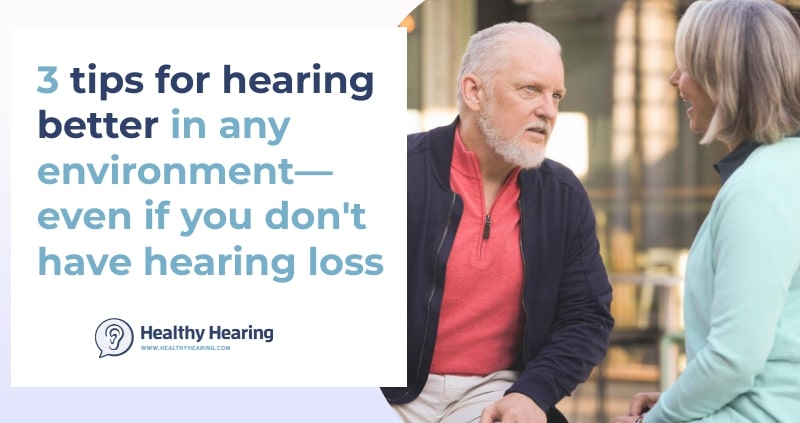|
www.HealthyHearing.com |
How to hear better in even the most challenging places (like a crowded restaurant)Your environment plays a big role in how well you hear
Contributed by Madeleine Burry Even if you have bat-level hearing abilities, some spaces are terrible for hearing and may leave you with listening fatigue. Add in hearing loss and you may want to run out of the room out of frustration. The places we go affect how well we can hear. The most challenging scenario is when three factors—poor acoustics, tons of background noise, and too much space between you and the speaker—occur simultaneously. But even one of those factors has an effect on your ability to hear clearly. The good news? “Within each one there’s definitely things that can be done,” says clinical audiologist Dr. Candice "Evie" Ortiz-Hawkins, AuD, ABAC, CCC-A, of Capital Institute of Hearing & Balance in Maryland. Here, Ortiz-Hawkins shares why each of these environmental factors affect your ability to listen and comprehend—and helpful accommodations to overcome the hearing challenges they cause.
1. Consider acousticsAcoustics are how sounds travel through a given space—when a room is stark and bare, the sound bounces around off of walls, floors, and other surfaces. Soft touches, such as rugs, swallow up sounds so they bounce around less. That's why movie theaters are so cozy—all those curtains, carpeting, fabric-covered walls and plush seating help absorb harsh sounds, reducing echoes. In a “reverberant environment,” especially one where many people are talking, hearing is hard because all of the sounds are “echoing and bouncing,” says Ortiz-Hawkins. By the way, poor acoustics can make it challenging for anyone to hear—not just people with hearing loss. Tips for overcoming poor acoustics
Look for places with a different type of ambience, Ortiz-Hawkins says. Think cozy. “So some curtains, some nice cushiony seats, maybe some carpet on the floor, because all of those kinds of acoustics are going to deaden or dampen the amount of reverberation that you're going to hear in an environment,” she says. 2. Don't keep your distance“Good communication skills say you should never be that far away,” Ortiz-Hawkins says. That is, if there’s a schoolyard of space between you and the person you’re talking to, you’ll need to shout and hearing will be hard. The close you are to the person you’re speaking with, the better, Ortiz-Hawkins says. “One arm's length away is typically an acceptable proximity for people,” she says. “You don't feel like someone's in your personal bubble, but they're still close enough for you to discern what they are saying.” Tips for overcoming distanceAim to stay in the same room during conversations (and get relatively close to your conversational partner if possible). It’s not just that the sound will have to travel less far. When someone is nearby, it also makes it possible to pick up on visual cues, Ortiz-Hawkins says. You’ll be able to read their lips, see their expression, and catch any gestures (like a head tilt or pointing finger that can help clarify exactly what item they want you to pick up), she says. Ask folks to say your name first before starting a conversation, Ortiz-Hawkins says. This will get your attention, so you know to listen. 3. Don't let noise clutter your environment“Our brains function better when there’s contrast,” Ortiz-Hawkins says. That’s not just a visual matter, she explains. Think about Where’s Waldo. The reason it’s hard to locate Waldo is because there’s so much visual clutter on the page. “If you remove some of that extraneous information, it's easier for you to spot him,” she says. And that’s the case for sound, too—the more background noise is present, the harder it is to hear your conversational partner. The speech signal gets lost. It’s easier on your brain when it “doesn't have to tease through all of the extraneous noise to try to figure out what is being said,” she says. Ortiz-Hawkins shares a few strategies:
More:
Bonus tips: When you’re having an important conversation, try to do so in a conducive atmosphere (with dampening acoustics, close proximity, and limited background noise). And, ask people to write down important things, like the name of a prescription or the phone number, Ortiz-Hawkins says. Plus, try to train your loved ones to rephrase when you can’t hear them initially—that way, you can pick up on additional context clues, she says. That is, if someone asks “Want anything from the grocery?” and you can’t hear, they should try rephrasing, and asking: “Do we need milk or eggs from the supermarket?” When all three factors are in playListening in a space with poor acoustics, far-away conversation partners, and lots of background noise is going to be hard. “That’s probably the worst situation,” Ortiz-Hawkins says. Still, using the steps mentioned above can help. Plus one more biggie: Plan ahead, Ortiz-Hawkins says. That way, you can be strategic, going to a restaurant before the dinner rush or grabbing a seat at a panel discussion that’s near the stage (or the speaker system). Even knowing the itinerary or planned speaking order can help you anticipate what’s coming next, Ortiz-Hawkins points out. “Just always be prepared before you go to whatever place you're going so that you can modify the situation to be a better listening experience for you,” she says. Madeleine Burry
|
Featured clinics near me
Earzlink Hearing Care - Reynoldsburg
7668 Slate Ridge Blvd
Reynoldsburg, OH 43068

Find a clinic
Need a hearing test but not sure which clinic to choose?
Call 1-877-872-7165 for help setting up a hearing test appointment.



 Madeleine Burry is a Brooklyn-based freelance writer and editor. She's written about health for several online publications, including Women's Health, Prevention, Health, Livestrong and Good Housekeeping. You can follow her on Twitter @lovelanewest.
Madeleine Burry is a Brooklyn-based freelance writer and editor. She's written about health for several online publications, including Women's Health, Prevention, Health, Livestrong and Good Housekeeping. You can follow her on Twitter @lovelanewest.